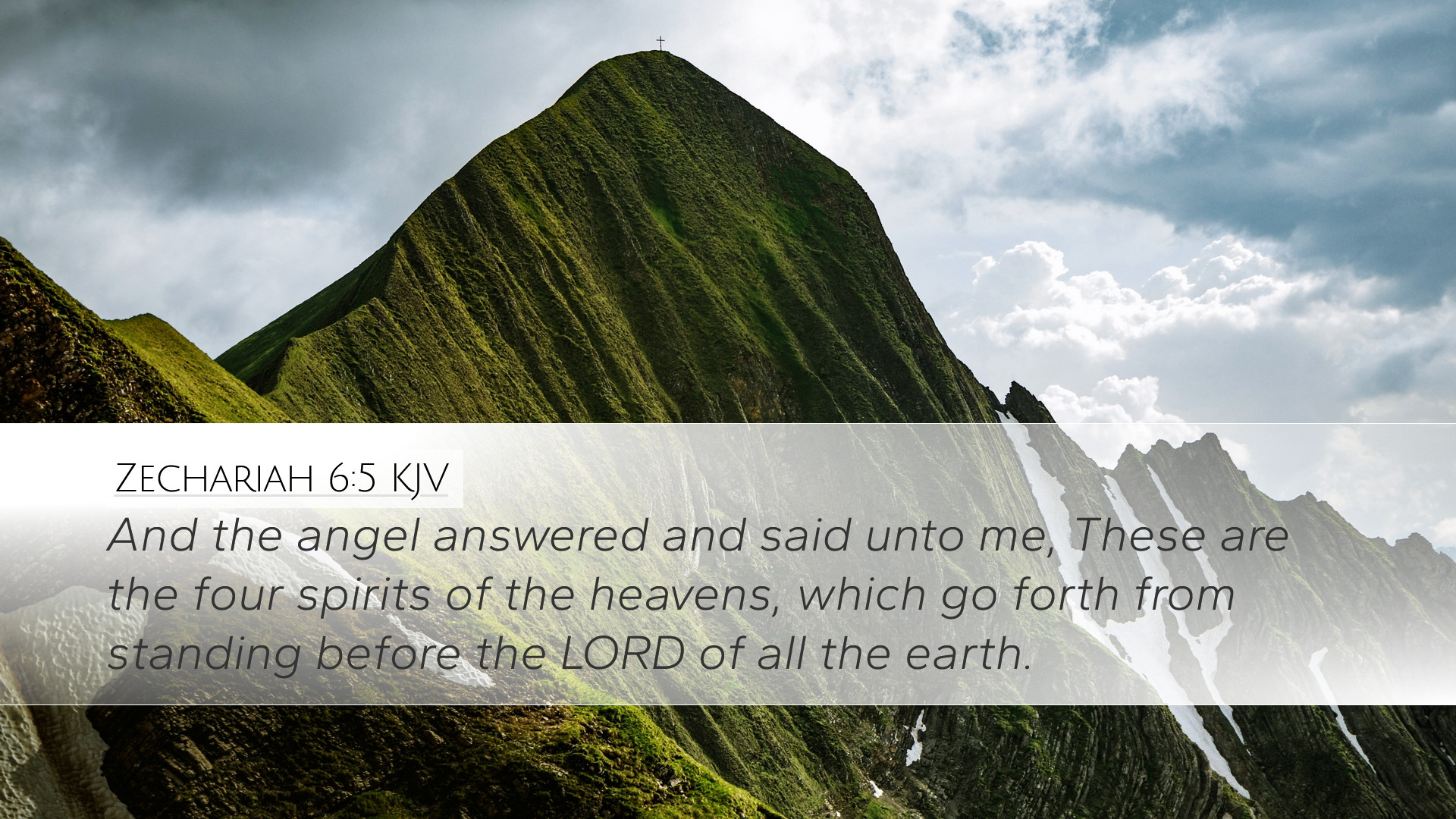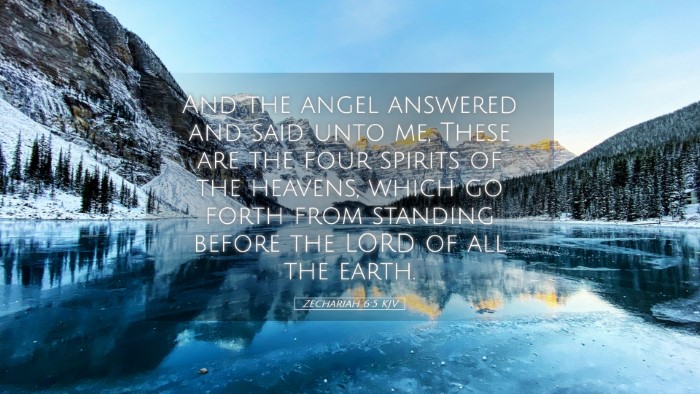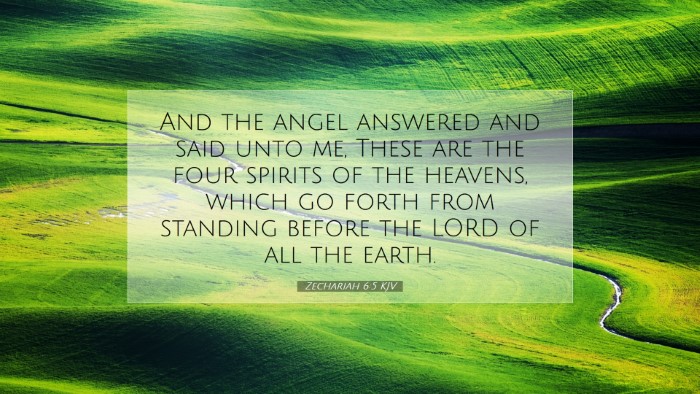Old Testament
Genesis Exodus Leviticus Numbers Deuteronomy Joshua Judges Ruth 1 Samuel 2 Samuel 1 Kings 2 Kings 1 Chronicles 2 Chronicles Ezra Nehemiah Esther Job Psalms Proverbs Ecclesiastes Song of Solomon Isaiah Jeremiah Lamentations Ezekiel Daniel Hosea Joel Amos Obadiah Jonah Micah Nahum Habakkuk Zephaniah Haggai Zechariah MalachiZechariah 6:5
Zechariah 6:5 KJV
And the angel answered and said unto me, These are the four spirits of the heavens, which go forth from standing before the LORD of all the earth.
Zechariah 6:5 Bible Commentary
Commentary on Zechariah 6:5
Verse Text: "And the angel answered and said unto me, These are the four spirits of the heavens, which go forth from standing before the Lord of all the earth."
Introduction
The passage of Zechariah 6:5 is steeped in rich imagery and profound meaning, serving as a key verse in the prophetic literature of the Old Testament. Here we find a revelation concerning heavenly agents or "spirits" that are sent forth by God to fulfill His purposes. In studying this verse, we will draw upon insights from various public domain commentaries, including those by Matthew Henry, Albert Barnes, and Adam Clarke, to provide a comprehensive understanding significant for pastors, students, theologians, and Bible scholars.
Contextual Background
The book of Zechariah, written during the post-exilic period, is filled with apocalyptic visions and messages intended to encourage the remnant of Israel. Understanding this verse requires a grasp of the context in which it was written—an era marked by both hope and despair, as the Israelites sought to rebuild their temple and restore their national identity after Babylonian captivity.
Historical Setting
Zechariah prophesied around the time of Haggai, approximately 520 B.C. The rebuilding of the temple was not merely a physical endeavor but a restoration of the worship and presence of God among His people. The visions Zechariah experienced served as divine assurances to the Israelites that God's plans for them were still in motion.
Analysis of the Verse
This verse introduces the concept of the "four spirits" or "four winds" of heaven, which can be interpreted as divine forces acting at God's command. Each commentary provides nuanced insights into these themes.
Matthew Henry's Commentary
Matthew Henry emphasizes the sovereignty of God and the ministry of these "spirits" in fulfilling divine decrees. He notes that the term "spirits" is often associated with angels or heavenly messengers. Henry illustrates that these spirits operate in God's authority and represent various aspects of God's governance over the earth. His interpretation highlights the assurance that believers have in God's oversight and control of worldly affairs.
Albert Barnes' Commentary
Albert Barnes offers a more detailed exploration of the allegorical significance of the four spirits. He notes that in biblical literature, the number four often represents universality or completeness. This indicates that the forces at work in the earth encompass all realms—spiritual, political, and natural. Barnes also discusses how these spirits may correspond to the four corners of the earth, emphasizing that God's influence extends to every part of creation, ensuring that no area lies outside His providence.
Adam Clarke's Commentary
Adam Clarke provides a technical examination of the original Hebrew terminology. He interprets the "spirits" as not merely being angels but a representation of God's power and movement across the earth. Clarke underscores that these spirits are agents of God's will, instilling a sense of peace and security among God's people, affirming that God is actively involved in the affairs of humanity. He also makes connections to the visions in earlier chapters, suggesting a continuity of divine revelation through the prophets.
Theological Implications
The passage not only presents a description of the heavenly realm but also carries rich theological implications for understanding God's nature and His relationship with creation.
Divine Sovereignty
All commentary sources converge on the notion that this verse underscores God's sovereignty. The "four spirits" are depicted as being under God's command, suggesting that He is actively engaged in directing universal affairs. This theological viewpoint serves as a comfort and reassurance for believers who may feel overwhelmed by worldly chaos.
Angelic Ministry
The angelic ministry described serves to illustrate the means through which God interacts with humanity. As spiritual beings, these angels answer to God and execute His directives, indicating that there is a divine order and hierarchy even within the spiritual realm. This notion is crucial for a deeper understanding of God's work in the world.
Hope and Restoration
For the Israelites, the acknowledgment that God has sent forth His spirits serves as a significant hope for restoration. This message of divine assistance is paramount for a community rebuilding both physically and spiritually. Believers are reminded that God’s plans involve human restoration and divine empowerment.
Practical Applications
This passage holds profound significance for contemporary readers, offering several applicable principles:
- Trust in God's Sovereignty: Believers are encouraged to trust in God's control over all aspects of life, including spiritual and political landscapes.
- Awareness of Divine Activity: Christians are reminded to recognize and respond to God's activity and guidance in their lives, seeing situations through a spiritual lens.
- Participation in God's Work: Understanding that believers are agents of God's will on earth encourages active participation in God's redemptive mission.
Conclusion
In Zechariah 6:5, we discern a powerful message concerning the divine orchestration of events through the "four spirits" sent forth from God. The insights from Matthew Henry, Albert Barnes, and Adam Clarke collectively enrich our understanding of this verse, highlighting God's sovereignty, the role of angels, and the hope of restoration for His people. As we engage with this text, may we find assurance in God's active presence in our lives and His unwavering commitment to His creation.


